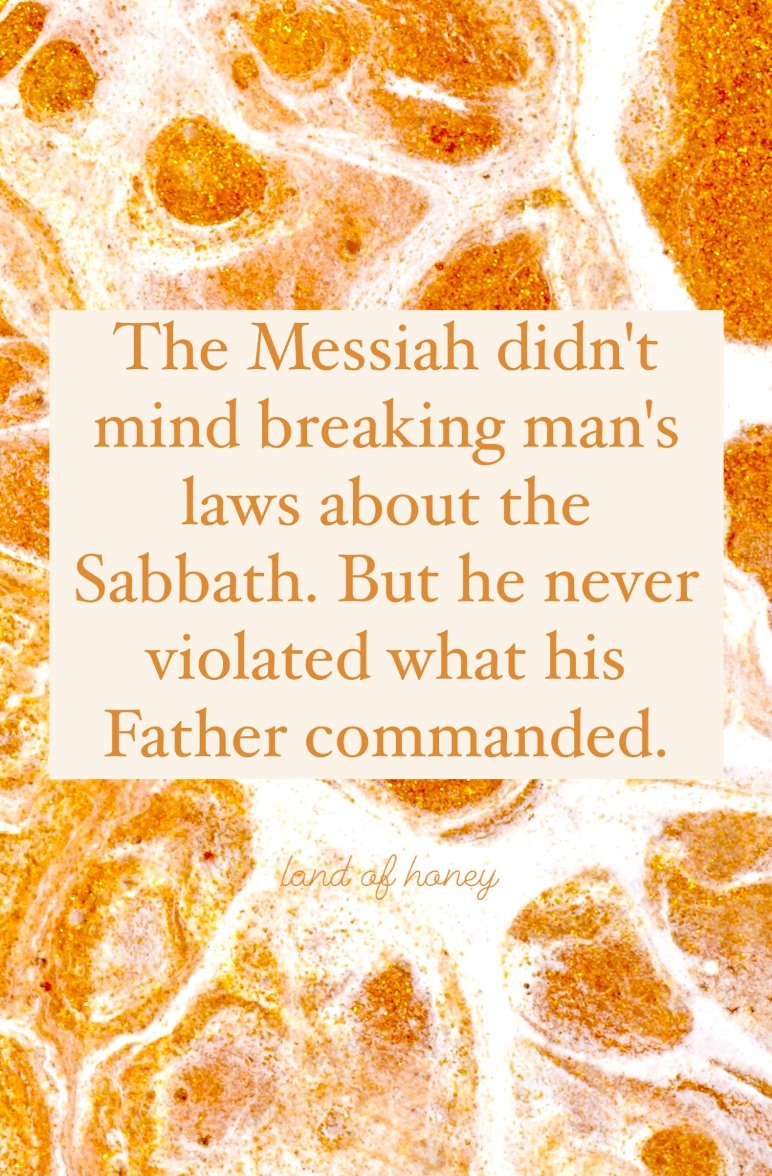Did Jesus break the Sabbath? Did he do things that went against the commandments of the Bible when it came to the set apart day of the week? Lots of people believe that the Messiah broke the Sabbath day when he walked on earth. In the Gospels he frequently had run-ins with the Pharisees and religious leaders of his day about what was appropriate behavior that would keep the Sabbath day holy. There seem to be verses and statements in the New Testament saying that he violated the Sabbath day in some way. Here we are going to examine if Jesus broke the Sabbath.
What does the Bible tell us about the Jesus and the Sabbath?
"For this reason they tried all the more to kill him not only was he breaking the Sabbath, but he was even calling God his own Father, making himself equal with God." -John 5:18
There it says Jesus was breaking the Sabbath. That seems rather clear, doesn't it? If we flipped our Bible open to this verse and read without context it would be hard to take this verse to mean anything other than: Jesus broke the Sabbath. Heaven knows plenty of pastors, teachers, and Bible commentators have done this.
But this view leaves out the context of what was happening and overlooks how the story is being told. If we pull a verse like this out of context we will inevitably misunderstand the true meaning of this Biblical passage and description of the Savior.
We can see throughout the Gospels that the religious leaders disagreed with the Messiah about how the Sabbath day should be kept. They considered healing on the Sabbath to be a major offense. This comes up in Matthew 12, Mark 3, Luke 6, and John 9. This was such an issue at the time that each Gospel writer included this in their writing.
"They questioned Jesus, asking, 'Is it lawful to heal on the Sabbath?'" -Matthew 12:10
"The scribes and Pharisees were watching him closely to see if he healed on the Sabbath." -Luke 6:7
Before studying and reading the entire Old Testament, I assumed that the Pharisees were upset because God had a law against healing on the Sabbath. I knew there were rules about the Sabbath, and these guys were the religious experts, so they would know...right? The Old Testament is huge, there must be a command prohibiting Sabbath healings somewhere in there.
But then I read the Old Testament, and I read for myself that there is no such Biblical commandment that says that healing is prohibited on the Sabbath. This means that this is not an instruction of YHWH. And if it's not a commandment, then breaking it doesn't violate the Sabbath. This means that Jesus didn't break the Sabbath!
But what about John 5:18 and similar verses like John 9:16? They literally say that the Messiah did break the Sabbath.
If we look at them in context, these verses like these say that the religious leaders thought he was breaking the Sabbath. They also thought he wasn't from God, so if we accept that their opinion was correct and he was breaking the Sabbath, that would mean he wasn't sent from God.
"Some of the Pharisees said, 'This man is not from God, for he does not keep the Sabbath.'" -John 9:16
Someone's opinion, no matter how popular that person is, or what their credentials are, is not always correct. While these statements are included in the New Testament, that is to tell us what was happening - the religious leaders said it was wrong to heal on the Sabbath, but Jesus did so anyway - and this is not the same as Biblical truth. Yes, it's true that they said and believed that the Messiah was breaking the law, but that doesn't mean it's true that he was.
By healing on the Sabbath, the Messiah not only demonstrated his compassion for people and his desire for our physical wellness. He also showed us through this how seriously he took the word of God. He wasn't going to stand for substitutions of religion. He wasn't okay with saying a human belief or law was the same as commandments from his Father. He refused to perpetuate the belief that what religious leaders said was the same as Biblical law. He wasn't interested in the appearance of looking spiritual; he wanted to love his neighbors while still showing love to God by keeping his commandments.
The activities that Scripture records the Messiah doing on the Sabbath are all things that fit within the Biblical instructions of what to do on that day. He healed, taught, went for walks, and dined in the homes of friends on the Sabbath. In every single story that we have of his life, not once does the Bible record him doing anything that breaks a Biblical law about the Sabbath.
The Bible's commands for the Sabbath mostly consist of things like we should rest on it, work is prohibited, and it's a day for worshipping YHWH instead of pursuing our own interests. In every story we have of his life, we see that the Messiah kept the Biblical instructions about the Sabbath day. Since healing on the Sabbath is not prohibited by Scripture, he was free to do so without violating or breaking the set apart day in any way.
The Messiah didn't mind breaking man's commandments about the Sabbath. But he never violated what his Father commanded.
Related posts:
Did Jesus Break the Law?
Traditions and Commandments in the New Testament
The Three Types of Laws in Scripture
.JPG)
.JPG)









